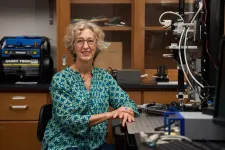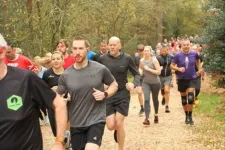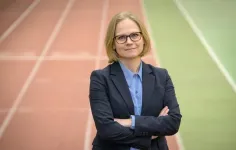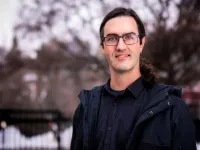(Press-News.org) When the phone rang on a September afternoon, University of Cincinnati's Shailaja Paik, PhD, tired from a full day of meetings and teaching, did not expect to hear news that would leave her “ears numb.”
“I had been named a (MacArthur) fellow, and I wasn’t sure I was hearing correctly, but I tried to keep my cool,” she remembers, chuckling. “I thought, ‘Is this right? I’m going to ask her to repeat herself.’
“I was ecstatic.”
The MacArthur Fellows Program, also called the "Genius Grant," is a prize awarded annually by the John D. and Catherine T. MacArthur Foundation to between 20 and 30 “extraordinarily creative individuals with a track record of excellence in a field of scholarship or area of practice, who demonstrate the ability to impact society in significant and beneficial ways through their pioneering work or the rigor of their contributions." This year, the foundation selected 21 fellows, one of which is Paik.
MacArthur fellows receive a grant of $800,000 over five years, no strings attached, to help advance their academic pursuits; fellows are nominated and endorsed by their peers. They do not apply and are never interviewed for the fellowship before it’s awarded.
“I have had friends and colleagues who have told me that I should be the recipient of this award, but it’s not something I can apply for, so getting the call was a shock,” she says. “I do know people who have become fellows in the past, and their work is incredible, so to be in the same group of geniuses means a lot to me, and it means a lot for the work I have done over long years.
“I’m happy to have the ‘big genius’ feather in my cap, now.”
Paik, a Charles Phelphs Taft Distinguished Research Professor of History and affiliate in Women's, Gender, and Sexuality Studies, Asian Studies and sociology in UC’s College of Arts and Sciences, is only one of 10 MacArthur Fellows to be named in Ohio and the first ever in both the city of Cincinnati and the University of Cincinnati since the award began in 1981.
“This is one of the highest recognitions for intellectual accomplishment and impact that a faculty member can win globally,” said UC President Neville G. Pinto, who called Dr. Paik to congratulate her. “We are so thrilled that Dr. Paik has been recognized for her remarkable scholarship working with a population of people who have been overlooked and discriminated against for centuries.”
The Dalits, 'the untouchables’
Paik says caste is a complex system made up of many distinctions of ranked groups that marry within the limits of a certain community. It is a division of society based on differences of inherited social rank or privilege, profession and occupation, and it continues to exist in India’s society, politics and economy. The term Dalit means “the oppressed,” and it is the lowest stratum of the caste in India.
“To be a Dalit, is to be born Dalit, is to be born into a caste system that sanctions Dalits as impure, polluted, and hence, ‘untouchable,’” says Paik. “Dalits comprise about 17% of India's population and historically they have not been allowed access to education in any form, access to common public goods, in terms of public tanks, water wells or even some of the most basic things like wearing footwear or new, clean clothes, even if they can afford them. To be a Dalit woman is to be doubly oppressed, that is both by the politics of caste as well as gender. To be a Dalit woman is to be the ‘Dalit of the Dalit, slave of the slave.’
“This is a community that I belong to, and it has been the center of my research and writing for 25 years.”
Paik grew up in the city of Pune with her three sisters in a 20-by-20-foot room. They lived in a tenement in the Yerawada slums.
“We did not have a regular water supply or a private toilet and, yes, I grew up with garbage and dirt around me, and pigs roaming the alleys. I am still traumatized by the memories of the public toilets,” she says.
Paik remembers carrying large vessels of water for cleaning and cooking on her head from the city public water tap.
“It has a very deep impact — socially, educationally, emotionally, psychologically,” she adds.
However, Paik’s father, Deoram F. Paik, sought an “English education” for his children, as a way to help them find their way to a better future; she said her mother, Sarita Paik, also protected her and her sisters, making sure that the dangers of their environment didn’t interfere.
“Studying was a challenge, so I remember wrapping myself up in a quilt and telling my family members to speak softly and not make any noise," she recounts. "I would go to sleep around 7:30 p.m. until around 2 or 3 a.m., then get up at that time and study until 6 or 7 a.m. and then get ready for school. This was the time I carved out to study and learn.”
She was the first Dalit person to attain the highest scores in high school. This set the trajectory for where she is today.
“I just poured myself into academics — education and employment were the magic wands to escape the slum,” she says.
“This fellowship is a celebration of the enormous contributions of Dalits — their ideas, actions, history and fight for human rights. It is a fantastic reminder of the contributions Dalit studies as well as me, a Dalit woman scholar, have made to the different fields of knowledge,” Paik adds. “After experiencing discrimination in terms of caste, gender and race, I have worked my way up and out from the under with grit, determination and hard work. Dalit women shared their lives with me, and I am indebted to them as well as my advisors, mentors, colleagues and friends who have participated in this journey.
"I hope this achievement will strengthen the fight of both Dalits and non-Dalits against caste discrimination in and beyond South Asia.”
Shining a light on oppression
In addition to being named a MacArthur Fellow, in her time at UC, Paik has been awarded the Frederick Burkhardt Fellowship from the American Council of Learned Societies, the Stanford Humanities Center Fellowship, the American Institute of Indian Studies Fellowship, the Luce Foundation Fellowship and the 2023 John F. Richards Prize, as well as the Ananda Kentish Coomaraswamy Prize, in South Asian History for her book, “The Vulgarity of Caste: Dalits, Sexuality and Humanity in Modern India (Stanford University Press, 2022).”
She says this funding will allow her to continue her research and writing, helping educate others and creating documentation about the lives of the Dalits and the caste system.
“Official historical records have failed to document the lives and actions of the oppressed,” she says. “As a result, I have created my own methods and archives to record the experiences of the most oppressed. Focusing on multilingual and multi-archival research, methodologically, I adopt an integrative, mixed-methods approach and juxtapose hitherto neglected, unexamined and under-examined English and Marathi materials in archives, ethnographies, popular writings and films, to offer a fuller understanding of India’s history.”
“I couldn’t be more pleased for Professor Paik,” says Pat Limbach, PhD, vice president for research at the University of Cincinnati. “Being recognized as a MacArthur fellow is one of the highest honors that can be bestowed upon a scholar. Her work has been transformative — giving voice to the voiceless — and she herself is a testament to the power of education. Dr. Paik is a shining example of the impact and importance of scholarly work, and I am so proud that she will have an even larger platform through the John D. and Catherine T. MacArthur fellowship.”
"This is a great and well-deserved honor for Professor Paik and a testament to the impact our faculty in UC's College of Arts and Sciences are making in the world," adds Dean James Mack, PhD. "She has a passion for making the world a better place, and I know the investment that the MacArthur Foundation is making in her scholarly work will have a global impact in various communities. Professor Paik’s research exemplifies the critical role of the humanities in sharing human experiences and driving change. We are truly fortunate to have her as a member of our university community."
Paik says that part of her mission is to spread the message that it takes more than the oppressed to overcome oppression — it takes all of humanity.
“We need to work together to battle this and do the anti-racist, anti-caste, anti-patriarchal work,” she says. “The biggest problem is when people, especially the oppressors, try to push the burden of fighting discrimination onto the oppressed. We need to stand together and support each other through all this for our global collective humanity.”
END
University of Cincinnati professor named MacArthur fellow
Shailaja Paik receives ‘Genius Grant’ to continue her work with Dalits, ‘the untouchables'
2024-10-01
ELSE PRESS RELEASES FROM THIS DATE:
Research provides new insights into role of mechanical forces in gene expression
2024-10-01
The genome inside each of our cells is modelled by tension and torsion — due in part to the activity of proteins that compact, loop, wrap and untwist DNA — but scientists know little about how those forces affect the transcription of genes.
“There are a lot of mechanical forces at play all the time that we never consider, we have very little knowledge of, and they’re not talked about in textbooks,” said Laura Finzi, the Dr. Waenard L. Miller, Jr. ’69 and Sheila M. Miller Endowed Chair in Medical Biophysics at Clemson University.
Transcription is the process by which a cell makes an RNA copy of a segment of DNA. One ...
HSE scientists have developed a new model of electric double layer
2024-10-01
This new model accounts for a wide range of ion-electrode interactions and predicts a device's ability to store electric charge. The model's theoretical predictions align with the experimental results. Data on the behaviour of the electric double layer (EDL) can aid in the development of more efficient supercapacitors for portable electronics and electric vehicles. The study has been published in ChemPhysChem.
Many devices store energy for future use, with batteries being among the most well-known examples. They can consistently release energy, maintaining steady power output regardless of existing conditions or load, until fully ...
UK ParkRun participants report improved life satisfaction six months later
2024-10-01
UK ParkRun participants report improved life satisfaction six months later, with most benefit for the least active people, and an estimated value between £16.70 and £98.50 for every £1 of running costs.
####
Article URL: https://journals.plos.org/globalpublichealth/article?id=10.1371/journal.pgph.0003580
Article Title: The impact of parkrun on life satisfaction and its cost-effectiveness: A six-month study of parkrunners in the United Kingdom
Author Countries: United Kingdom
Funding: This study was funded by Sheffield Hallam University (SJH and AB) and by The University of Sheffield (HQ). The funders had no role in study design, data collection and analysis, ...
‘Who’s a good boy?’ Humans use dog-specific voices for better canine comprehension
2024-10-01
The voice people use to address their dogs isn’t just because of their big puppy eyes. Humans slow their own speech when talking to their dogs, and this slower tempo matches their pets’ receptive abilities, allowing the dogs to better understand their commands, according to a study published October 1st in the open-access journal PLOS Biology by Eloïse Déaux of the University of Geneva in Switzerland and colleagues.
Dogs respond to human speech, even though they themselves cannot produce human sounds. To better understand how people ...
A third of Swedish cheerleaders tell of psychological abuse
2024-10-01
Of current and former cheerleading athletes in Sweden, 29% reported being subjected to psychological abuse in the sport, according to a new study from Linköping University, Sweden. The study shows that dissatisfaction with leadership, injuries, high expectations and bad atmosphere in the team are major reasons why athletes give up the sport.
“It’s similar to what we see in other sports: that it’s primarily psychological abuse that stands out,” says Carolina Lundqvist, docent in psychology and sports science and licensed psychotherapist at the Department of Behavioural Sciences at Linköping ...
Authoritarian populism has weakened democracy in Brazil - study
2024-10-01
The rise of authoritarian populism in Brazil weakened structures that stabilise democracy – mirroring trends in wider global society and potentially making it harder for the country to strengthen its democracy in future, a new study reveals.
The experiences of Brazilians in recent years under the administration of former President Jair Bolsonaro highlight the weakening of welfare systems and human rights protections critical in maintaining democratic stability.
This, in turn, contributed to the rise of militarism ...
Climate scientists express their views on possible future climate scenarios in a new study
2024-10-01
A new survey of climate experts reveals that a majority believes the Earth to be headed for a rise in global temperatures far higher than the 2015 Paris Agreement targets of 1.5 to well-below 2°C.
The study was published in the Nature journal Communications Earth & Environment. It also shows that two-thirds of respondents — all of them authors on the Intergovernmental Panel on Climate Change (IPCC) — believe we may succeed ...
Anu wins first place, $20,000 in SCORE’s 60th Anniversary Pitch Competition
2024-10-01
WEST LAFAYETTE, Ind. — Anu™, a health and wellness brand developing innovative controlled-environment agriculture systems, won first place and $20,000 among 10 small businesses at the national SCORE 60th Anniversary Pitch Competition in Des Moines, Iowa. SCORE, or Service Corps of Retired Executives, is a resource partner of the U.S. Small Business Administration.
Purdue University alumni Scott Massey and Ivan Ball founded anu. The company has received financial support from the Purdue Research Foundation.
“This funding ...
NSF funds project to examine social, environmental impacts of AI
2024-10-01
As artificial intelligence continues to expand its footprint across society, some researchers are raising questions about the potential negative impact of this technological transformation.
Associate professor Mar Hicks and assistant professor Jess Reia of the University of Virginia’s School of Data Science are partnering with Tamara Kneese and the Data and Society Research Institute to examine this critical issue in a project that the National Science Foundation recently awarded a two-year, $300,000 grant.
Working with the Data ...
New study: neuroscientists spark shelter-seeking response by reactivating memory circuit
2024-10-01
FOR IMMEDIATE RELEASE
Using a sophisticated brain-imaging system, neuroscientists at Johns Hopkins Medicine say they have successfully reactivated a specific memory circuit in mice, causing them to seek out shelter when no shelter is actually present.
The researchers say the study, published Sept. 27 in Nature Neuroscience, advances understanding of how memories are structured in the mammalian brain. The findings could one day point to new ways of slowing down or preventing the memory loss that accompanies ...
LAST 30 PRESS RELEASES:
Public and patient involvement in research is a balancing act of power
Scientists discover “bacterial constipation,” a new disease caused by gut-drying bacteria
DGIST identifies “magic blueprint” for converting carbon dioxide into resources through atom-level catalyst design
COVID-19 vaccination during pregnancy may help prevent preeclampsia
Menopausal hormone therapy not linked to increased risk of death
Chronic shortage of family doctors in England, reveals BMJ analysis
Booster jabs reduce the risks of COVID-19 deaths, study finds
Screening increases survival rate for stage IV breast cancer by 60%
ACC announces inaugural fellow for the Thad and Gerry Waites Rural Cardiovascular Research Fellowship
University of Oklahoma researchers develop durable hybrid materials for faster radiation detection
Medicaid disenrollment spikes at age 19, study finds
Turning agricultural waste into advanced materials: Review highlights how torrefaction could power a sustainable carbon future
New study warns emerging pollutants in livestock and aquaculture waste may threaten ecosystems and public health
Integrated rice–aquatic farming systems may hold the key to smarter nitrogen use and lower agricultural emissions
Hope for global banana farming in genetic discovery
Mirror image pheromones help beetles swipe right
Prenatal lead exposure related to worse cognitive function in adults
Research alert: Understanding substance use across the full spectrum of sexual identity
Pekingese, Shih Tzu and Staffordshire Bull Terrier among twelve dog breeds at risk of serious breathing condition
Selected dog breeds with most breathing trouble identified in new study
Interplay of class and gender may influence social judgments differently between cultures
Pollen counts can be predicted by machine learning models using meteorological data with more than 80% accuracy even a week ahead, for both grass and birch tree pollen, which could be key in effective
Rewriting our understanding of early hominin dispersal to Eurasia
Rising simultaneous wildfire risk compromises international firefighting efforts
Honey bee "dance floors" can be accurately located with a new method, mapping where in the hive forager bees perform waggle dances to signal the location of pollen and nectar for their nestmates
Exercise and nutritional drinks can reduce the need for care in dementia
Michelson Medical Research Foundation awards $750,000 to rising immunology leaders
SfN announces Early Career Policy Ambassadors Class of 2026
Spiritual practices strongly associated with reduced risk for hazardous alcohol and drug use
Novel vaccine protects against C. diff disease and recurrence
[Press-News.org] University of Cincinnati professor named MacArthur fellowShailaja Paik receives ‘Genius Grant’ to continue her work with Dalits, ‘the untouchables'





